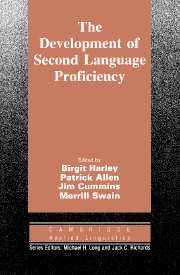Book contents
- Frontmatter
- Contents
- List of contributors
- Series editors' preface
- Acknowledgments
- Introduction
- I THE NATURE OF LANGUAGE PROFICIENCY
- II CLASSROOM TREATMENT
- III SOCIAL AND INDIVIDUAL VARIABLES
- IV PRACTICAL AND POLICY IMPLICATIONS
- V THIRTY-FIVE YEARS OF RESEARCH ON BILINGUALISM
- CONCLUSION
- References
- Author Index
- Subject Index
Introduction
Published online by Cambridge University Press: 05 October 2012
- Frontmatter
- Contents
- List of contributors
- Series editors' preface
- Acknowledgments
- Introduction
- I THE NATURE OF LANGUAGE PROFICIENCY
- II CLASSROOM TREATMENT
- III SOCIAL AND INDIVIDUAL VARIABLES
- IV PRACTICAL AND POLICY IMPLICATIONS
- V THIRTY-FIVE YEARS OF RESEARCH ON BILINGUALISM
- CONCLUSION
- References
- Author Index
- Subject Index
Summary
This book is about a major five-year research project conducted during the 1980s in the Modern Language Centre at the Ontario Institute for Studies in Education. The purpose of the project, entitled the Development of Bilingual Proficiency (DBP), has been to examine a number of educationally relevant issues concerning the language development of school-age children who are learning a second language. Specific issues addressed in the research are: the nature of language proficiency, the effect of classroom treatment on second language learning, the relationship of social-environmental factors to bilingual proficiency, and the relationship between age and language proficiency. The research draws on a variety of minority and majority language learning populations attending schools in the Province of Ontario, including students of Japanese-, Portuguese-, and Spanish-speaking home backgrounds, students attending a French-language school, and students of mainly Englishspeaking home background learning French as a second language in core and immersion programs.
The aim of this book is not to present the component studies of the Development of Bilingual Proficiency project in all their detail, but instead to place the project in perspective by bringing together short summaries of the research on each issue and a set of discussion papers written by experts in the area of bilingualism and second language education. These papers, prepared for a project symposium held at the Ontario Institute for Studies in Education in November 1987, provide a reflective, and sometimes critical, view of the DBP studies from the outside.
- Type
- Chapter
- Information
- The Development of Second Language Proficiency , pp. 1 - 4Publisher: Cambridge University PressPrint publication year: 1990
- 3
- Cited by

